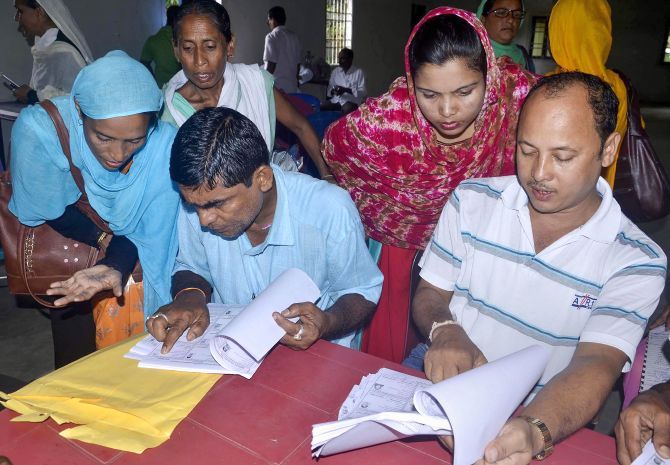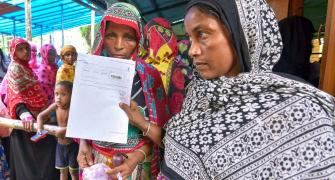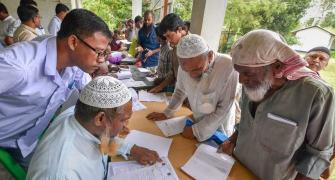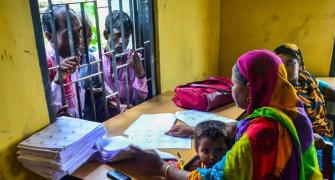'They don't have enough food to feed these people; they get stale daal-chawal; there isn't enough water to bathe or for morning chores; the toilets are filthy; no fans inside the rooms. They give food only once a day many times and many people are taking ill and even dying inside these camps.'

Two persons, one legally assisting the affected people because of their exclusion from the National Register of Citizens (NRC), and another whose relative has been declared a 'foreigner' by the quasi-judicial Foreigners' Tribunal (FT), talk to Rediff.com's Prasanna D Zore about the issues on the ground that people excluded from the NRC are facing and how it can turn into a long-drawn legal process.
Subedar Major Mubaraq Ali (retired), whose wife's relative has been declared a 'foreigner' by one of the FTs, discusses the problems faced by the girl as she finds herself left out of the NRC just because of mismatch in the name of her village in her school's register when she was admitted and her school leaving certificate.
Ali also helps the affected people with their documentation to prove their citizenship in FTs.
As Kafkaesque as it may sound, while this girl was declared a 'foreigner', her parents and her three children find their names in the NRC.
Mrinmoy Dutta, a practising advocate of Guwahati high court has represented several 'foreigners' legally and has been assisting them to prove their citizenship in the FTs.
Dutta says he has no idea about what happens to the future of lakhs of people who might end up as 'foreigners' but will have nowhere to go.
'The pot will be kept boiling for a long time to come'
How are you affected by the NRC?
My wife's relative is in trouble. Her village name was mentioned incorrectly in her school register. Her school was between two villages. She and another girl from the next village got admitted at the same time. The clerk clubbed the villages of these two girls together. My wife's relative belonged to Hugli village but the school clerk mentioned it as Rampur, the village to which the other girl belonged.
But when they gave her school leaving certificate, her village name was mentioned as Hugli. Her name in the NRC was under the D (doubtful) voter category. When she went for the hearing at the FT, her school register, which mentioned her village as Rampur, was called for. But the school leaving certificate had Hugli as her village name.
The FT declared her as 'foreigner'.
Interestingly, this girl's parents find themselves as Indian citizens in the National Register of Citizens.
What will be this girl's future if the FT rejects her plea and declares her as 'foreigner' again?
Let me narrate the entire story to you.
The girl was married to a boy who belongs to a village near the Nagaland-Assam border. Their house was burnt down by Naga militants and hence they could not register themselves as voters there. When she finally got registered as a voter when she was 22, she was put in the 'D' category. They asked her why she didn't register herself as voter after she turned 18.
Her case was referred to the FT and they rejected her plea to include her name in the NRC. We then approached the Guwahati high court where she got bail because of which she is not in one of the detention camps till the high court announces the judgement in her case.
What is a detention camp? What is life inside a detention camp feel like?
Those declared as 'foreigner' by the FT are detained in these camps where they are confined to a place. Males and females are detained in separate tenements. Currently, we have detention camp only in Kokrajhar where these detainees are kept; the rest are accommodated in various jails across the state along with petty criminals.
They don't have enough food to feed these people; they get stale daal-chawal; there isn't enough water to bathe or for morning chores; the toilets are filthy; no fans inside the rooms. They give food only once a day many times and many people are taking ill and even dying inside these camps.
Assuming that if out of the 20 lakh people who don't find their names in the NRC, 10 lakh do get included in the NRC, then does Assam government have enough detention camps to accommodate as many as one million people?
That's why additional detention camps are being set up with urgency. I don't think we can build the detention camps to accommodate 20 lakh people who will have to go to these camps in case their pleas are rejected again by the FTs.
Does your wife's relative have children? And are their names included in the NRC?
Yes, she has three children and their names are included in the NRC.
Where will they send her in case the FT rejects her plea again?
She will be sent again to the detention camp. According to the new rules she will have to stay in the detention camp for three years and after that she will be released on a surety of Rs 1 lakh bond and after doing her biometric identification she will be allowed to go back to where she came from.
But she will have to go to her local police station and sign a register every week.
This Supreme Court order came in July 2019.
So, anybody declared a 'foreigner' will have to stay in the detention camp for three years?
Recently, the Supreme Court passed an order to release people who have spent more than three years in a detention camp; they don't have enough space in these detention camps to accommodate so many people so this SC order offers some relief.
Ten people were released from these detention camps this August.
So, once declared a 'foreigner' they won't be sent to some foreign country?
Once declared a 'foreigner', the person will have no right as an Indian citizen and will not be able to get any benefits of government programmes.
Working people who will be detained in these camps will lose their jobs.
What is likely to happen now that the final NRC list is out?
Whoever finds their names excluded from this final list will have to approach the FTs with their cases. For this they will need umpteen documents to prove their nationality. Till now, voters' list was allowed as a proof of citizenship but now they want certified copies of land documents.
Assuming that even 20,000 people in my district Sunitpur don't have these documents and they go to the district collector for getting them. How many people do you think will be able to procure these documents?
And those excluded in the final list will have to produce these documents within 120 days of filing the case with the FTs. In addition to the two existing FTs, the government is setting up three more FTs in Sunitpur district; there are plans to set up 104 new FTs in the entire state, in addition to the 96 that already exist, to hear appeals of those rejected in the final list.
And these are not just Muslims whose names have been excluded from the list. There are Hidnu Bengalis too; there are the gorkhas; then people who are from Bihar have been labelled 'foreigners' too.
This is a big political game and this issue will not find any satisfactory resolution; the pot will be kept boiling for a long time to come.
What's the situation at the ground level? Are people insecure, scared about their future?
This is very interesting now. When the state was hit by severe floods this year, people were not scared about their lives and property but documents that they had inside their houses. They say that even if our homes are destroyed we can rebuild them but losing our citizenship will destroy our lives completely.
They are scared that they will be sent to Bangladesh or to detention camps.
The biggest harassment faced by people excluded from the NRC is that they have to travel at least eight to ten times across districts for the hearings. They have no idea how they will fund their travels as most of these are very poor labourers.
I know of cases where people received summons from the FTs in the evening to appear for hearings 400 km away the next morning.
'Will Bangladesh automatically accept them?'
How are the people whose names have been excluded from the NRC list reacting?
There is some relief among the excluded people as the government has now provided a window of 120 days, instead of the 30-day window earlier, to file their cases and plead with the FTs to prove their citizenship.
People now have some more time to arrange for the necessary papers and documents that can help them prove that.
So, now there will be no detention during this 120-day window?
That's what the newspapers have been saying.
If the FTs declare a person as 'foreigner', what other recourse does she or he have?
Once that happens, the aggrieved party can always knock on the door of the high court; if the high court rejects their plea, they can still go to the Supreme Court. The FTs declaring people as ''foreigners' is not the end of the road.
The legal process will be on and under Article 226, writ petitions can be filed in the high court. These legal provisions can still remain open for the aggrieved parties. The SC will have a final say in these matter then.
Now that the final list is out, people will now have the opportunity to file their appeals in the FTs. But the process will take some great deal of time to get initiated as the state government will have to set up 104 more tribunals in addition to the 96 that already have been adjudicating on people's appeals. So, the authorities have extended the window to file appeals to 120 days from the date of release of the final list (August 31) instead of 30 days.
Once the FTs decide upon individual cases they will still have the high court and SC options open in case they still get excluded from the NRC list.
Now that the aggrieved parties will have four months to prove their citizenship and further the option to go to the courts, why was the August 31 deadline being looked at as if it would be the end of the road for those not in the NRC?
The scare was not about the August 31 deadline. The real fear was about what will happen to them if their appeals are rejected by the FTs. There is a scare that once that happens they might be put in detention camps about which we will know only later. At this stage it is very difficult to say.
What exactly are detention camps and why do they evoke so much fear among the people?
They are not supposed to be jails but then there will be confinements. While earlier it was kind of indefinite detention, the SC has now said that people who have spent three years under detention could be released after providing sureties. There have been cases also where the (Guwahati) high court has intervened in many cases and ordered that there will no detention until the cases are decided by it.
Many people who were declared 'foreigners' had approached the high court and while admitting their petitions the high court has granted interim orders staying detentions of people declared as 'foreigners'. So, detention may not be an immediate threat.
As per the latest proceedings people have been given an opportunity to provide additional documents during the 120 day period in support of their citizenship.
In this case, it is likely to become a long-drawn legal process?
It appears we are heading in that direction.
If a person is declared as a 'foreigner' even after taking recourse to all the legal options, where will these people be sent to? Will they be sent to Bangladesh?
That's another tricky issue one will come across when that stage is reached.
Let's say a person's name doesn't figure in the NRC of India for whatever reasons then does she/he automatically become citizen or national of some other country? That will then bring us to the issue of deciding the citizenship of that person.
Can the Government of India deport such 'foreigner's forcibly to Bangladesh or some other neighbouring country?
Sending people across the border forcibly is a difficult proposition because how do you send lakhs of people across the border. These are the grey areas that need to be looked into.
Has the government any idea as to what they will have to do once these lakhs of people are declared 'foreigners'?
So far as I know, till date this position is not very clear. Even if we had an extradition treaty with Bangladesh, and if our courts decide these people are 'foreigner's, will Bangladesh automatically accept them? They are very unlikely to do that.
In that case what is the NRC exercise likely to achieve for India?
Very difficult to say, or, for the government to decide.
Is it then a road to nowhere?
I cannot comment on that because only time will tell what the India government will do with these 'foreigners' when they are finally declared so.










